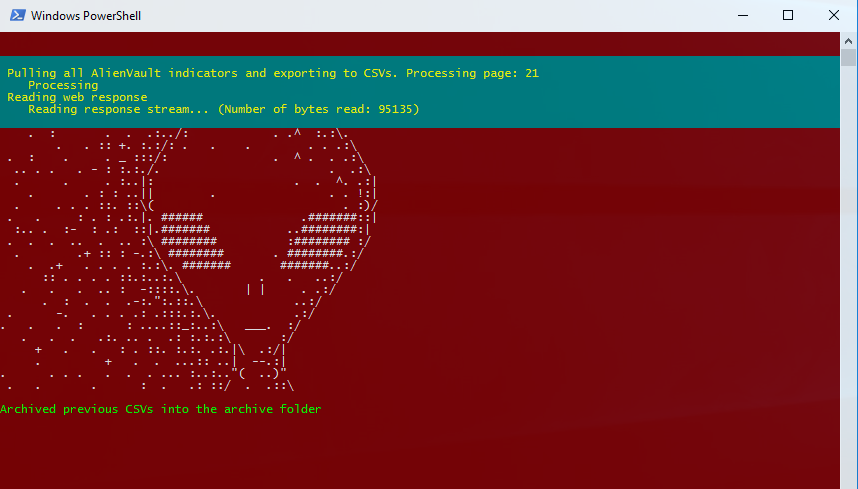AlienVault OTX(Online Threat Exchange) - Powershell IoC Collector


So I wanted to automate IoC(Indicators of Compromise) collection and discovered AlienVault OTX product. I work in a primarily windows workstation environment and Powershell is my goto language for just about everything since since it is native on every system since Windows 7.
Below is a script I developed to gather indicators from all subscribed pulses on OTX with powershell. It gathers each indicator by type, IE: IPv4, URL, Hostname etc, and then exports each seperate indicator type into CSV files that can be imported into another system like your SIEM.
This script is located on my Github, and will have the most recent updated version.
#
# Powershell script to pull indicators from Alien Vault Opensource Threat Exchange(OTX) and export to CSVs for importing into Arcsight or other SIEM.
# Written by Wylie Bayes 02/23/2018
#
# Define Main Function, set variables to Null, and then define as arrays.
function GetOTX-Data {
clear
$otxkey = "YOUR API KEY GOES HERE!!"
# Define export location.
$exports = "C:\Exports"
$whitelists = "C:\Whitelists"
# How old are indicators allowed to be in days
$daysold = "30"
#
$FileHashesEPO = $null
$FileHashesPalo = $null
$hostnames = $null
$IPV4s = $null
$IPV6s = $null
$Emails = $null
$URLs = $null
$CVEs = $null
$counts = $null
$total = $null
$hostnames = @()
$IPV4s = @()
$IPV6s = @()
$URLs = @()
$FileHashesEPO = @()
$FileHashesPalo = @()
$Emails = @()
$CVEs = @()
$counts = @()
;""
;""
;""
#Populate our awesome ascii art into an array
$alien = @"
Alien Vault
. . . . . . . . . + .
. . : . .. :. .___---------___.
. . . . :.:. _".^ .^ ^. '.. :"-_. .
. : . . .:../: . .^ :.:\.
. . :: +. :.:/: . . . . . .:\
. : . . _ :::/: . ^ . . .:\
.. . . . - : :.:./. . .:\
. . . :..|: . . ^. .:|
. . : : ..|| . . . !:|
. . . . ::. ::\( . :)/
. . : . : .:.|. ###### .#######::|
:.. . :- : .: ::|.####### ..########:|
. . . .. . .. :\ ######## :######## :/
. .+ :: : -.:\ ######## . ########.:/
. .+ . . . . :.:\. ####### #######..:/
:: . . . . ::.:..:.\ . . ..:/
. . . .. : -::::.\. | | . .:/
. : . . .-:.":.::.\ ..:/
. -. . . . .: .:::.:.\. .:/
. . . : : ....::_:..:\ ___. :/
. . . .:. .. . .: :.:.:\ :/
+ . . : . ::. :.:. .:.|\ .:/|
. + . . ...:: ..| --.:|
. . . . . . . ... :..:.."( ..)"
. . . : . .: ::/ . .::\
"@
# Write out pretty ascii art to the screen.
write-host "$alien"
# Define our Error preference.
$ErrorActionPreference = "SilentlyContinue"
# Archive previous days export into the archive folder.
$archive = get-childitem "$exports\*.csv"
if ($archive -ne $null){
Move-Item $archive "$exports\archive\" -Force
write-host "Archived previous CSVs into the archive folder" -foregroundcolor "Green"
} else {
write-host "No previous CSV's to archive. Continuing" -foregroundcolor "Yellow"
}
# Pull in White Lists for Exclusions
$IPv4WL = Import-CSV "$whitelists\IPv4s.csv" | where {(get-date $_."WhiteListed Date") -gt (get-date).AddDays(-30)}
$CVEWL = Import-CSV "$whitelists\CVEs.csv" | where {(get-date $_."WhiteListed Date") -gt (get-date).AddDays(-30)}
$DomainOrHostnameWL = Import-CSV "$whitelists\DomainOrHostnames.csv" | where {(get-date $_."WhiteListed Date") -gt (get-date).AddDays(-30)}
$EmailWL = Import-CSV "$whitelists\Emails.csv" | where {(get-date $_."WhiteListed Date") -gt (get-date).AddDays(-30)}
$FileHashWL = Import-CSV "$whitelists\FileHashes.csv" | where {(get-date $_."WhiteListed Date") -gt (get-date).AddDays(-30)}
$URLWL = Import-CSV "$whitelists\URLs.csv" | where {(get-date $_."WhiteListed Date") -gt (get-date).AddDays(-30)}
# Get the date for naming CSV exports at the end.
$date = get-date
# Define a bit of regex for later
$regex = "[^a-zA-Z]"
# Define first page to begin.
$next = "https://otx.alienvault.com/api/v1/pulses/subscribed/?limit=10&page=1"
do {
write-progress "Pulling all AlienVault indicators and exporting to CSVs. Processing page: $page"
$indicators = invoke-webrequest -URI $next -UseBasicParsing -Headers @{"X-OTX-API-KEY"="$otxkey"} -UseDefaultCredentials
# Convert JSON data received into powershell object.
$data = $indicators.Content | ConvertFrom-Json
# Populate the next page into $next variable.
$next = $data.next
$page = $next.split("&")[1].split("=")[1]
#
$filtered = $data.Results | where {$_.References -ne $null}
if ($filtered){
foreach ($item in $filtered){
$name = $null
$name = $item.Name -replace $regex
$LastModified = get-date $item.Modified
if ($LastModified -gt (get-date).AddDays("-$daysold")){
foreach ($indicator in $Item.Indicators) {
# Gather Domain and Subdomain Names Indicators
if ($indicator.Type -eq "hostname" -or $indicator.type -eq "domain" -and $indicator.indicator -notin $DomainOrHostnameWL.DomainOrHostName){
if ($item.References -like "*http*") {
$hostnames += new-object PSObject -Property @{"Hostname"="$($indicator.Indicator)"; "Name"="$($name)"; "Reference"="$($item.References)"} | Select Hostname,Name,Reference
}
}
# Gather All IPV4 Indicators
if ($indicator.Type -eq "IPv4" -and $indicator.indicator -notin $IPv4WL."IPv4 Address"){
if ($item.References -like "*http*"){
$IPV4s += new-object PSObject -Property @{"IPv4 Address"="$($indicator.Indicator)"; "Name"="$($name)"; "Reference"="$($item.References)"} | Select "IPv4 Address",Name,Reference
}
}
# Gather All IPV6 Indicators
if ($indicator.Type -eq "IPv6"){
if ($item.References -like "*http*"){
$IPV6s += new-object PSObject -Property @{"IPv6 Address"="$($indicator.Indicator)"; "Name"="$($name)"; "Reference"="$($item.References)"} | Select "IPv6 Address",Name,Reference
}
}
# Gather All URL Indicators
if ($indicator.Type -eq "URL" -and $indicator.indicator -notin $URLWL.URL){
if ($item.References -like "*http*"){
$URLs += new-object PSObject -Property @{"URL"="$($indicator.indicator)"; "Name"="$($name)"; "Reference"="$($item.References)"} | Select URL,Name,Reference
}
}
# Gather all File Hash Indicators
if ($indicator.Type -eq "FileHash-MD5" -or $indicator.Type -eq "FileHash-SHA1" -or $indicator.Type -eq "Filehash-SHA256" -and $indicator.indicator -notin $FileHashWL.FileHash){
if ($item.References -like "*http*"){
if ($item.References -ne $null -and $item.References -like "*http*"){
$FileHashesEPO += new-object PSObject -Property @{"FileHash"="AppHash: $($indicator.Indicator)"; "Name"="$($name)"; "Reference"="$($item.References)"} | Select FileHash,Name,Reference
$FileHashesPalo += new-object PSObject -Property @{"FileHash"="$($indicator.Indicator)"; "Name"="$($name)"; "Reference"="$($item.References)"} | Select FileHash,Name,Reference
}
}
}
# Gather all Email Indicators
if ($indicator.Type -eq "email" -and $indicator.indicator -notin $EmailWL."Email Address"){
if ($item.References -like "*http*"){
$Emails += new-object PSObject -Property @{"Email"="$($indicator.Indicator)"; "Name"="$($name)"; "Reference"="$($item.References)"} | Select Email,Name,Reference
}
}
if ($indicator.Type -eq "CVE" -and $indicator.indicator -notin $CVEWL.CVE){
if ($item.References -like "*http*"){
$CVEs += new-object PSObject -Property @{"CVE"="$($indicator.Indicator)"; "Name"="$($name)"; "Reference"="$($item.References)"} | Select CVE,Name,Reference
}
}
}
}
}
}
} while ($next -ne $null)
# Export all indicators to CSVs if data exists in each object.
if ($hostnames){
$hostnames | ConvertTo-Csv -NoTypeInformation | Select -Skip 1 | Set-Content "$($exports)Hostnames_$($date.month)_$($date.day)_$($date.year).csv"
}
if ($IPV4s) {
$IPV4s | ConvertTo-Csv -NoTypeInformation | Select -Skip 1 | Set-Content "$($exports)IPV4s_$($date.month)_$($date.day)_$($date.year).csv"
}
if ($IPV6s) {
$IPV6s | ConvertTo-Csv -NoTypeInformation | select -Skip 1 | Set-Content "$($exports)IPV6s_$($date.month)_$($date.day)_$($date.year).csv"
}
if ($URLs) {
$URLs | ConvertTo-Csv -NoTypeInformation | select -Skip 1 | Set-Content "$($exports)URLs_$($date.month)_$($date.day)_$($date.year).csv"
}
if ($FileHashesEPO) {
$FileHashesEPO | ConvertTo-Csv -NoTypeInformation | select -Skip 1 | Set-Content "$($exports)FileHashesEPO_$($date.month)_$($date.day)_$($date.year).csv"
}
if ($FileHashesPalo) {
$FileHashesPalo | ConvertTo-Csv -NoTypeInformation | select -Skip 1 | Set-Content "$($exports)FileHashesPalo_$($date.month)_$($date.day)_$($date.year).csv"
}
if ($Emails){
$Emails | ConvertTo-Csv -NoTypeInformation | select -Skip 1 | Set-Content "$($exports)Emails_$($date.month)_$($date.day)_$($date.year).csv"
}
if ($CVEs){
$CVEs | ConvertTo-Csv -NoTypeInformation | select -Skip 1 | Set-Content "$($exports)CVEs_$($date.month)_$($date.day)_$($date.year).csv"
}
# Total up the indicators and create a CSV just for number tracking.
$total = $hostnames.count + $IPv4s.count + $URLs.count + $FileHashesEPO.count + $Emails.count + $CVEs.count
$counts = new-object PSObject -Property @{"Hostnames"="$($hostnames.count)"; "IPv4s"="$($IPv4s.count)"; "URLs"="$($URLs.Count)"; "FileHashes"="$($FileHashesEPO.count)"; "Emails"="$($Emails.Count)"; "CVEs"="$($CVEs.count)"; "Total"="$($total)"} | Select Hostnames,IPv4s,URLs,FileHashes,Emails,CVEs,Total
$counts | Export-csv "$($exports)Total_Numbers_$($date.month)_$($date.day)_$($date.year).csv" -NoTypeInformation
# Open exports folder and complete the operation.
write-host "Opening exports folder..." -foregroundcolor "green"
ii $exports
}
